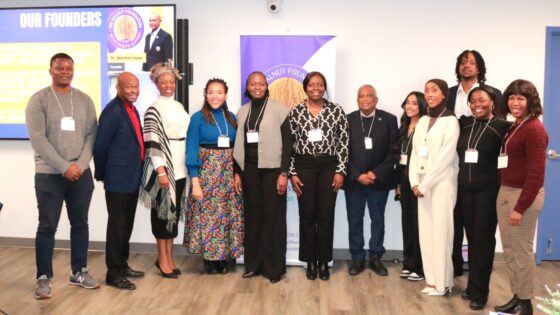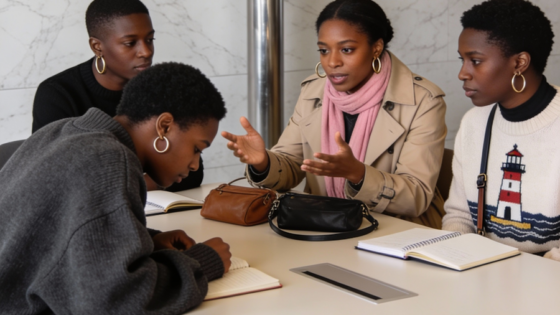BY SIMONE J. SMITH
“Instead of taking insults to my intelligence personally, I research, qualify, and then educate.”
Simone Jennifer Smith
I won’t lie. I have been in my feelings lately. Instead of staying in the feeling, I faced the facts that when it comes to this pandemic, I have to give credit where credit is due.
The mainstream media continues to impress me with their ability to manipulate, and present information in a way that drives fear, induces stress, and divides the masses. Mainstream media is the giant, and then you have a few tenacious individuals who have chosen to see through the hypocrisy, and work together to help their communities.
I know that there are members of the community who have been following our coverage of COVID-19. Some agree with us, and others think that we are endangering their health and well-being. Respectfully, I understand both sides, and this is why we move to bring credible, relevant content to our community.
This week, I turned to a cohort, who should have been turned to from the very beginning. In 1.5 million years of human existence, it is only for about the past 200 years that communities have not turned to their elders during times of extreme social strain. An anthropologist will coincide with the fact that in prehistoric times, the collection of wisdom found with our elders was the key to human survival.
Our elders have a wealth of experience. They have gained so much wisdom in their lifetime; it is almost idiotic to not turn to them, especially when they have experienced situations that you are personally struggling with.
Life is cyclical. What has happened before will happen again. There is nothing really new under the sun. When facing indecision, or dealing with an experience that you have never been through before, why not ask an elder? Find out how they handled the experience.
Last Friday, I had the opportunity to sit down with Dr. Richard Schabas, a retired physician, and Ontario’s Chief Medical Officer from 1987 – 1997. He happened to be the Chief of Staff at York Central Hospital during the SARS crisis in 2003. During this time, he spoke at “Pandemics and the Media: Global Health Challenges,” a conference that promotes the understanding about how to best inform the public in the event of an influenza pandemic.
Dr. Schabas spoke out against the WHO’s 2005 declaration of a pandemic third-stage alert for avian flu. He did not believe it was justified, as there was no substantive change in the behaviour of the disease. He was sure to point out that he believed that the decision was based on politics, not on scientific or biological events.
With his over 40 years of experience in the medical field, no one has been paying closer attention to this pandemic than Dr. Schabas. What he is focused on is the daily situation reports issued by the World Health Organization. What he shared with me that day was not only powerful, but also eye opening, even for me who has been following this pandemic, just as closely.
“We shouldn’t panic!” Dr. Richard Schabas
Let’s take a look at some facts. At the beginning of March 2020, Dr. Schabas contributed an article to the Globe & Mail, and in that article, he calls attention to the numbers.
“But in the same three months, there have been about three million deaths in China from other causes, and about 14 million deaths worldwide. During the same three-month period, according to Health Canada, there have been almost 10,000 deaths in Canada from tobacco addiction, for instance – and just one from COVID-19.”
(“Strictly by the numbers, the coronavirus does not register as a dire global crisis”, Globe and Mail, March 11th, 2020)
He stresses on paying attention to just the facts, not the sensationalized version of the facts. During his time dealing with SARS in 2003, he learned some powerful lessons. He shares his discomfort on how the WHO issues their daily reports. In his eyes, the reports given are wrong in many aspects. However, like I mentioned above, these larger global organizations are the strongest sources of information out there.
One thing he does not preach is complacency. He realizes that this disease is not going away anytime soon. He stresses that we need to be vigilant in our surveillance of the pandemic. Travellers from areas of active disease should be tested. Patients with atypical pneumonia should be hospitalized. People with COVID-19 need to be isolated, and their close contacts monitored. In his words,
“We need to be sensible. The province going back into a lockdown is not only unnecessary, it’s also damaging. Our last lockdown accomplished nothing. We need to establish our non-negotiable, which are school, and people’s ability to be financially independent. People have to be able to work.”
There is so much that I could share with you in this article, but I think that it would be better off if you heard it from him. I am going to share two topics that we went into: quarantines, and masks.
“Quarantine belongs back in the Middle Ages. Save your masks for robbing banks. Stay calm and carry on. Let’s not make our attempted cures worse than the disease.”
Quarantine
Quarantine is defined as “restrictions placed on the entrance to and the exit from the place or premises where a case of communicable disease exists.” It describes the actions directed at healthy people thought to have been exposed to a communicable disease and who may be nurturing the infection.
His article “Is the Quarantine Act Relevant,” Dr. Schabas goes into detail about why quarantining is not the best way to handle a pandemic. He shares that quarantine is an ancient concept. It can be traced back to the Black Death in 14th century Italy. At that time, the period of detention was 30 days, and was later modified to 40 days (quarantino). He calls these measures “harsh and stupid.” There are unmarked graves on Grosse-Île on the St. Lawrence River that bear witness to how well quarantine worked for them.
It was interesting to learn that about 40 years ago, quarantine had fallen into disrepute because of the widespread perception that it did not work. It became relevant again in the mid-1980s to describe an unsuitable effort to control the spread of HIV. Since then, quarantining has become a thing again. It gained strength during the SARS situation in 2003. Now, quarantining has turned into a measure to fight pandemic influenza.
Dr. Schabas introduced “The Control of Communicable Disease Manual,” which provides an authoritative summary of control measures for more than 150 infectious diseases of public health concern. The book recommends modified quarantine for only six diseases, and: influenza, smallpox or SARS are not on that list.
According to Dr. Schabas, for quarantine to be effective, three conditions must be met:
1. The disease must be efficiently transmissible in its incubation period or very early in its symptomatic stage. Case isolation, not quarantine, is appropriate for diseases that are spread only during symptomatic illness. Quarantine will be ineffective for diseases that can be spread by people with only asymptomatic illness.
2. Second, it must be possible and practical to identify all, or virtually all, people incubating the infection.
3. Third, infected people must comply with the conditions of the quarantine.
When I go through this list, I think to myself, what handbook is the government reading out of? Also, where are they finding their specialists? This unnecessary quarantining has hurt our communities. It has caused: diversion of scarce resources (toilet paper hoarding), augmentation of public fears and intolerances (mask-shaming), provocation of civil disobedience (non-maskers) and infringement of human rights.
“Masks have become a symbol. All it does is identify someone as being on the good side. Personally, I think it is silly to wear masks.”
Masks
Dr. Schabas mentions that he thinks that the governments are all caught up in a high stakes poker game where they can’t fold. Every country keeps upping the ante, and then other countries follow suit. He truly does not understand where the global governments are going with these measures. He feels that they have all over-reacted.
This is not the first time, nor will it be the last time I personally write about the harmful effects of masks. This is yet another doctor telling us that the use of masks is hurting rather than helping us.
There are studies that continue to show that the prolonged use of facemasks is associated with higher rates of respiratory infection and depression of the immune system.
Dr. Colin D. Furness, a professor from the University of Toronto, also is speaking out about the fact that wearing a mask can be dangerous. He notes that masks can collect bacteria and other viruses.
There was a study done in a U.K. medical journal, showing that health-care workers who wore cloth masks all day while working were 13 times more likely to get a respiratory illness when compared to those who only wore a mask when necessary.
Let’s wrap this up with one more study that supports Dr. Schabas’s attitude when it comes to masks. A Singapore study observed health care workers, and they found that those who wore their masks for long periods of time developed new headaches or exacerbation of their pre-existing headache disorders.
I want to be clear about something here. Dr. Schabas does not have any issues with people who want to wear masks; he just wants you to be doing it safely, and he thinks that mandating it is unnecessary.
I am starting to question certain things that I continue to hear in the mainstream media. As I question, I dig for answers, I consult with those who know more than me, and then, I share it with you. Do with it as you wish!
Stay in the loop with exclusive news, stories, and insights—delivered straight to your inbox. No fluff, just real content that matters. Sign up today!












